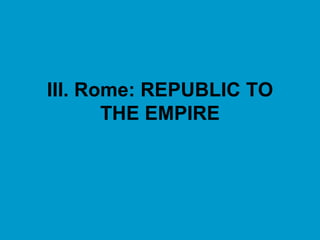Unit 1 presentation
- 4. Unit 1 Early Attempts at Democracy and Republic
- 5. Day 2 Objective: Identify the branches and types of government. Bell Ringer: ___________ Branch ___________ the law and is led by ________. ___________ Branch ___________ the law and is led by ________. ___________ Branch ___________ the law and is led by ________. Agenda: Review current events. Complete Vocabulary using blue booklets. Have review game for vocabulary quiz.
- 6. Day 3 Objective: Read and identify the major differences in governmental power. Bell Ringer: 1. What is the difference between an autocracy, oligarchy and democracy? Agenda: Vocabulary Quiz Reading Create essential questions Review reading
- 7. Day 4 Objective I: Recognize the purpose and organization of government. Objective II: Recognize how the founding father were influenced by Greece. Bell ringer: 1. What type of government does the USA have using terms learned from last week. Agenda: Notes Review Notes Class discussion.
- 8. I. Introduction What does the government do? Provides national security Public services (roads, bridges) Protects life, liberty, property Makes economic decisions (taxes, trade, money)
- 9. B. Ways to Organize Centralized or unitary – power comes from one place. Federal – power is shared between central and local government. Confederation – loose alliance of independent states.
- 10. C. Ways to Rule Autocracy Monarchy – King or Queen Dictator Emperor Oligarchy Aristocracy – nobility Communist Party Rule Military Control Democracy Direct – everyone votes on laws Representative - Republic
- 11. D. Branches of government Legislative – makes the law (Congress) Executive – carries out the law (President) Judicial – interprets the law (Supreme Court)
- 13. A. What influenced Greece? dominated by mountains, valleys & small plains small communities due to little arable soil difficult to communicate Had to sail to colonize, trade.
- 14. B. With so many independent states within Greece, what did they have in common? a common language a common heritage of myths the worship of the gods.
- 15. C. Athenian democracy… Lasted about 140 to 200 years Was not seen again until Colonial America. Demos meaning "people" and kratos meaning "rule."
- 16. D. How did democracy develop? Draco and wealthy nobility used harsh punishments to control people. After Draco’s death, Salon… Abolished enslavement of Athenian citizens. Created an assembly where all males over 18 could vote. Got rid of severe punishments
- 17. He created 10 artificial tribes. Each tribe chose 50 members to serve in the Council of 500. The Council made an agenda for the assembly. 10 generals were chosen by lot to be executives. E. Later, Clisthenes…
- 18. Day 5 Objective: Understand how Rome and its downfall influenced America . Bell Ringer: Who was the cruel leader and the reformer of Athens? Who made the law and who enforced it in Athens? Agenda: Reading Quiz Notes Review Notes Class Discussion
- 19. III. Rome: REPUBLIC TO THE EMPIRE
- 21. A. Formation of the Republic Removed cruel kings Conquered Ertuscans and had too much land and people. Used representative government to make laws.
- 22. B. Senate: Comes from sense (old men). 300 patricians (wealthy) who serve for life. Power resided there.
- 23. C. Assemblies: Citizens voted by tribes Elected officers Tribunes power of veto over law. Assemblies exist for soldiers and poor
- 24. D. Public Offices Financial officers, organizers of games, senior magistrates. Consul - preside over the Senate and are commanders - in - chief
- 25. E. Campaigning according to Cicero… have plenty of followers call everyone by name make promises, never say no. campaign in all parts of Rome
- 26. F. Candidate Togas were gleaming white – reflecting significance of officials. Campaigning was personal: Wrote on walls, paid for games or food.
- 30. G. Why didn't the poor revolt? Rich gave them food from the provinces & entertainment in exchange for votes. First welfare system. Senate made all citizens tax free, thus taxing provinces.
- 31. H. Triumvirate rules, destroyed by nobility Military became powerful. Caesar, Crassus, & Pompey divide power. Each wants what the nobility will not give… Pompey wanted a triumph parade Crassus wanted more money Caesar wanted to be dictator Crassus and Pompey were killed. Caesar took over, assassinated.
- 34. I. Roman Empire Augustus (nephew of Cesar) defeated Mark Anthony & Cleopatra. He ruled from 27 BC to 14 AD & re-organized Took title of “head magistrate.” Relatives (by blood & adoption) assume thrown of “Cesar.” Some are undeserving, many assassinations. Persecution of Christians occurred. Ruled till 96 AD. Picked successors brought wealth 100yrs.
- 36. J. Decline of the Empire Christianity becomes official religion. The Empire is split into West and East (Byzantine) 260 AD. The West falls to German Barbarians around 400 AD The East falls to Muslim Turks around 1492 AD.
- 37. K. Dark Ages and Feudalism. Fear & anarchy was replaced by local warlords. Eventually, they gather strength & land. Most powerful require allegiance from the weak and becomes monarchs. Poor worked on land and supply crops or taxes.
- 38. IV. English Constitutionalism
- 39. A. Monarchy and Constitutionalism France develops into an absolute rule, based on “divine right of kings.” King John of England isn’t allowed to bully nobles by the Magna Carta (1215) England erupts into Civil War (1642 -1651) when Charles I dismisses Parliament for not raising taxes. Puritan Parliament revolts.
- 40. B. Constitutionalism Results… Puritan Roundheads wins over Cavaliers and Oliver Cromwell is new brutal leader. Charles I is decapitated. People decide Puritan rule is too rough. New king is brought back to rule, but powers are limited. No troops in the home. No taxing without Parliament. No secret arrests.







































